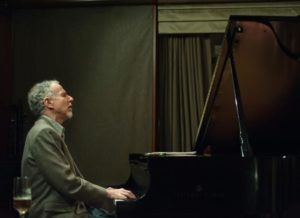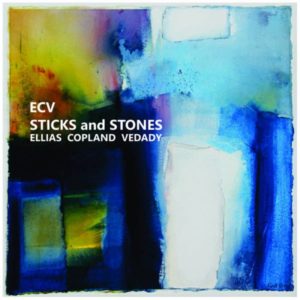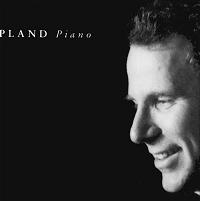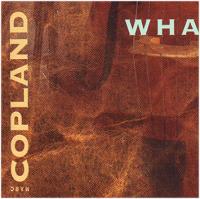
Sometimes an artist just sneaks up on you. You know about him, listen to him on different recordings, and one day, you just realize just how special he/she is.
I first became aware of Marc Copland on Songs Without End, a 1994 duo album with Ralph Towner. Copland was the perfect partner for Towner’s evanescent guitar. It’s not always easy to find that balance between piano and guitar, two chordal instruments that share a lot of the same sonic space, but these two found more than balance – they found the creative flexibility to sound almost orchestral, not just avoiding stepping on one another’s toes, but finding a synergistic platform that goaded each of them on, a good example being their interpretation of “Nardis,” which ascends to greater heights with every chorus.
When I think of Copland’s playing, words like elegant, understated and lyrical come immediately to mind. Copland uses his head and thinks on his feet, yet never loses touch with his heart, making for an appealing listening experience that is at once both intellectually stimulating and emotionally compelling. Although he continued to record through the 90s and into the new century, I lost sight of him until he began recording on the ECM label with John Abercrombie. Abercrombie found the perfect foil in Marc Copland. The two seemed to have a telepathic connection, and Copland delved deeply into Abercrombie’s obtuse harmonies. He was on only 2 quartet albums with Abercrombie on ECM, 39 Steps and sadly, John’s very last album, the stunning Up and Coming (easily of the best albums of 2017.) Both are essential albums for any lover of contemporary jazz.
Copland is one of those pianists who is forever on the road to new discoveries. He never seems to go for the obvious thing; he is simply incapable of playing a lick. A supple and elastic player who can be surprisingly muscular at times, he is also one of the most melodic pianists on today’s scene. He is one among a shortlist of players who, over the years, have honed their unique voice in an overcrowded field of post-Evans sound-alikes.
After rediscovering Copland, I was dismayed that there were only two albums of him with John Abercrombie. Or so I thought – then I happily discovered there are earlier associations with Abercrombie that go all the way back to 1990. I recently spent an unnaturally warm winter afternoon cycling to Sebastopol, listening to Marc’s album Another Day (Pirouette-2008) which features Abercrombie, Drew Gress, Billy Hart, and it’s every bit as rewarding as either of the ECM quartet albums. (Incidentally, there’s also a duet album with Abercrombie, titled Speak to Me, which I am trying to get ahold of.)
I also discovered Alone, one of several solo titles on his Pirouet label. Nestled between reimagined standards such as „Soul Eyes“ and „I Should Care“, are completely reharmonized versions of three early Joni Mitchell tunes, „I don’t know Where I stand“, „Rainy Night House“ and „Michael from Mountains“. Not many jazz pianists are drawn to folk artists for inspiration, but here Copland finds a lot of play with. Above the subtly applied dissonance and metallic voicings, it’s all about melody. In her early days, Mitchell wrote beautiful melodies and Copland finds much to dig into. His originals, such as the mysterious „Night Whisperers“ and the evocative „Into Silence“, fall nicely between the cracks.
I discovered another gem on TIDAL, an album he made with the late Michael Brecker, entitled Marc Copland And … It’s a real find. Oddly enough, the aggressive post-bop sound that characterizes much of this recording is punctuated by three distinctly different versions of Paul Simon’s “Old Friends”. Each of his reharmonizations of one of Simon’s most heartfelt tunes is a little miracle.
Another association worth mentioning is the collaborative trio with Abercrombie and Kenny Wheeler. They made two excellent albums for the Challenge label, Brand New (1999) and That’s for Sure (2008.) It’s a treat hearing these masters laying down Wheeler and Abercrombie tunes in an intimate trio with no drums or bass. Both are well worth picking up, especially if you’re a rabid Wheeler fan, as I am.
Before closing, I must also mention the Gary Peacock Trio, whose album Tangents was one of 2017’s best trio releases. I saw them in concert last spring at SF Jazz ECM festival, sadly in a way, because the Abercrombie Quartet had originally been scheduled, but John was quite ill and had cancelled his west coast tour. It was an incredibly dynamic performance, and one of the highlights of my concert going adventures last year. It was my first time seeing Copland live – a powerful and moving experience. Copland manages to be both delicate and visceral, his flowing lines fly like magical arrows that always hit their target.
At times I hear a little Richie Beirach, other times I hear the late John Taylor, yet the more I listen to Marc Copland, the more I hear Marc Copland. I’ll be exploring his back catalog for many years to come.
[Footnote: there’s a new trio album called ECV, with guitarist Roddy Elias, Copland and bassist Adrian Veddady that I’ve been hearing good things about. John Kelman reviewed it recently on allaboutjazz. Will report back after I live with it a while.]



